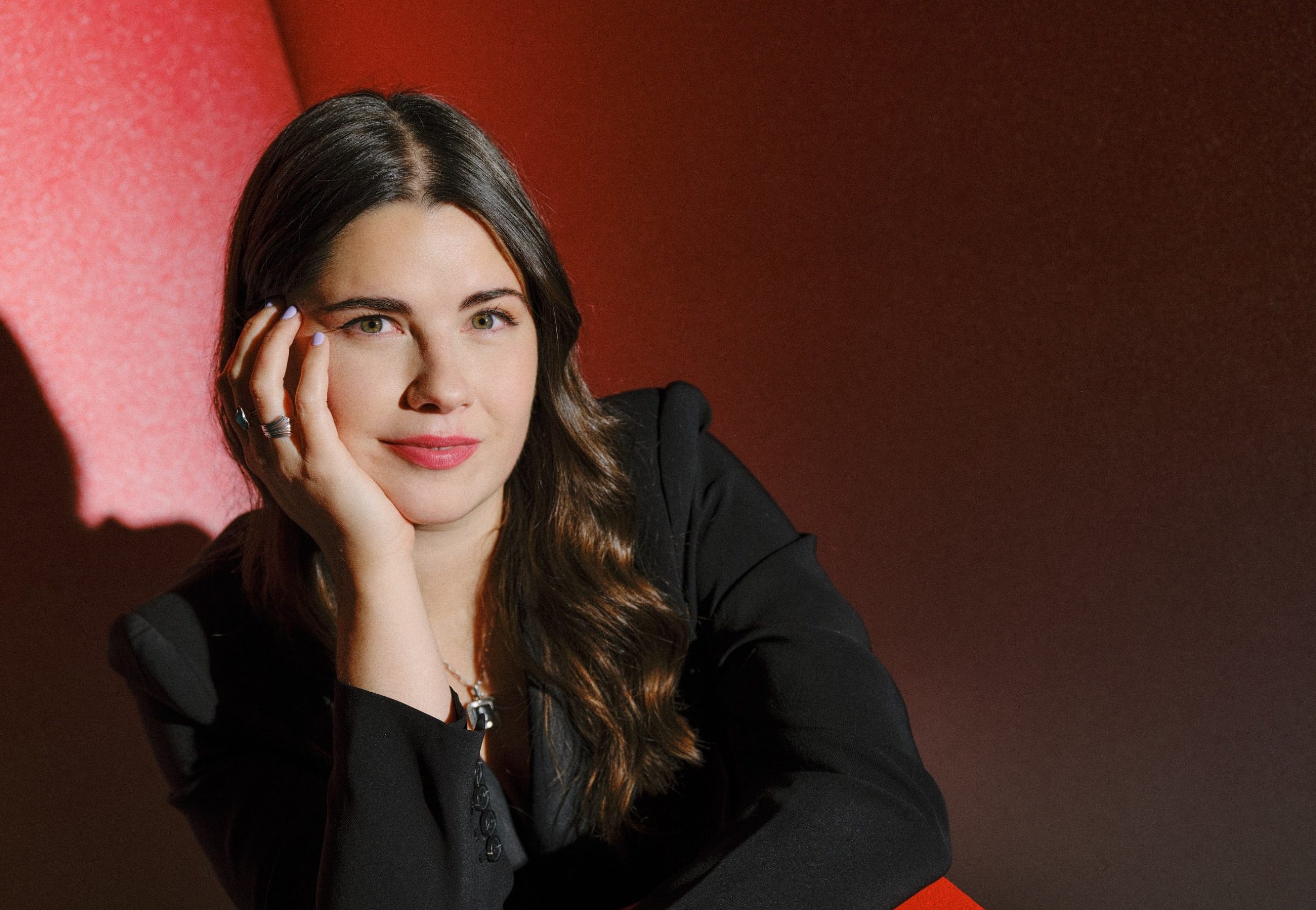
Print & Features Editor Jess Parker interviews Holly Reddaway, the voice and performance director for Baldur’s Gate 3, and a part of 2023’s UK BAFTA Breakthrough cohort.
BAFTA Breakthrough, supported by Netflix, is BAFTA’s flagship initiative for highlighting new talent working in film, games, and TV. This year marks BAFTA Breakthrough’s tenth anniversary, having supported over 200 people across the UK, US, and India.

Hi Holly, how are you feeling today?
I’m good, I’m feeling really excited. It’s nice to get talking about Breakthrough after sitting on this secret for a month or so.
The big question – how do you feel to be a part of this year’s BAFTA Breakthrough cohort?
Really thrilled. I think its really wonderful to have an organisation as prestigious and as inspiring as BAFTA name you as someone whose work they’re excited by and to recognise your work in this program. I think it’s very difficult to forge a career in the creative industry, especially as a freelancer, and I know that I certainly never take any time to reflect on any of the work that I’ve done; I’m always thinking about the next job and the next project, and what I can be doing to make this a sustainable career. So to have the opportunity to pause for a moment and take a moment to celebrate the journey up to now has been amazing. When I sat down to think about applying for Breakthrough I realised that I have 11 titles coming out this year, which I think until I’d done that, this would have just gone completely over my head. So to think about what’s to come and to feel grateful and to celebrate the journey that’s come before.
To have the opportunity to pause for a moment and take a moment to celebrate the journey up to now has been amazing
What drew you to freelance work? Did you ever consider that it might be too unstable, or were you always after this kind of career?
I was always very determined to give it a go and try to make it work. Firstly I wanted to be a theatre director because that was the only work that when I was younger I was aware that directors did. I did a drama degree and then I went to LAMDA to train as a director. While I was at LAMDA I had some brilliant advice from the actor Alistair Petrie. He was an ex-graduate, and he came in and said that you’ve just got to stick at it. He said that from his year at LAMDA, there were maybe five of them who were still acting, but the ones that were acting were doing very well. His career has really taken off. He’s had a really great career, but with the releases of Sex Education and The Night Manager, the past five or so years have been incredibly exciting for him. His advice to us was just ‘don’t give up, it will be shitty at times but just stick with it’. Although I haven’t been working as long as he has, that’s really stuck in my brain.
Following the MA Directing program, what first drew you to directing games, immersive, and animation?
Lots of different things really. I grew up playing games. I loved playing games but I stopped playing them when I went to University because I didn’t own my own console and didn’t have the money to buy one. I was directing as much as I could at University, and by the time I got to my third year I got very bored of making theatre work in the black box university spaces, so I started to do a lot of interactive and site-specific work. I did some shows in car parks, libraries, nightclubs, and observatories; I just tried to make my work as interactive as possible, so that was something I’ve always been interested in. When I graduated from LAMDA I was working in theatre. I had lots of friends who were talking about work they’d done as actors in games, and that was a sort of light bulb moment. I thought ‘Oh my gosh, someone must be directing that’, and it really has enabled me to make the interactive work that I was drawn to.
Stemming from this move from theatre to the interactive, how do you think theatre has influenced your current work?
In absolutely everything that I do. Fundamentally, when working with actors, knowing how to note actors, and knowing the language that actors know to use. Thinking about working with motion capture, I often use Laban from theatre training. The thing that is very different from theatre to games is that in theatre you have a whole rehearsal process to find what the answers might be and to make discoveries as a director trying to get actors to create something that is different every night, and to build a process that enables them to play in the room. But with games, you just have to get one take that is the right take, but much quicker. All of that language of intentions, objectives, and actions really helps me work in an efficient way. All of your script prep is still the same: where are we, what do they want, what’s happened between this scene and the last scene. I use all of the work that I did in theatre to prepare by script but the answers that I’m looking for are slightly different in games, but much of the process I’ve borrowed and adapted. I certainly think that my background in theatre is what makes me strong in my work today, and so much of that is working with actors and understanding the ways in which actors like to work. Every actor is different, so being able to create tailored notes for each actor really enables them to do their best work. It absolutely is all theatre.
I certainly think that my background in theatre is what makes me strong in my work today
How did you find transitioning from purpose-built, fully staged sets to more imagined virtual spaces?
I love it. The thing I love most about games is that it feels like such a pure form of acting because it’s all in the imagination, you might have some stand-in props to work with but you haven’t got any naturalistic sets to work with. Often actors won’t have any other actors with them so they’ll be working in isolation, so it really is sort of the most stripped-back medium. Equally, I often find you’re working in the most elaborate and fantastical worlds, so it requires a lot of imaginative thinking. O find that really liberating as I think, for actors, something that games really offer is the idea that if you can become it you can do it, so actors aren’t bound to the same casting types that they might have for screen and theatre. So if you can be a goblin, and if you can be a seven-year-old boy and a sixty year-old witch, and you can do all of those things, then you can come and be it. For actors it is very liberating and as a director that brings me so much joy in this job because you get such a wide array of characters. I think for my friends who are actors, what they have found an almost disappointing factor is that they want to become an actor because they want to transform, yet when they leave drama school they realise that they’re always being cast as the teenage girl or they’re always only doing period drama; they never get to do those fun characters that they imagine themselves being, and I think games can give actors a playground for that.
The thing I love most about games is that it feels like such a pure form of acting because it’s all in the imagination
And finally, what kind of games are you enjoying at the moment?
I’ve been replaying Unpacking because that’s my comfort game, I absolutely love it and I think the music is gorgeous. I often find that because I spend my days working on projects like Alan Wake II and Baldur’s Gate IIII like more chilled games to unwind with. A game that I’m really excited to play soon is the new Spider-Man (Marvel’s Spider-Man 2, 2023). I’m really looking forward to having a bit more time and getting to hang out in that world!
UK Breakthroughs 2023
- Adjani Salmon, writer/performer/exec producer – Dreaming Whilst Black
- Bella Ramsey, performer – The Last of Us
- Cash Carraway, creator/writer/exec producer – Rain Dogs
- Charlotte Reganm, writer/director – Scrapper
- Cynthia De La Rosa, hair & makeup artist – Everyone Else Burns
- Ella Glendining, director – Is There Anybody Out There?
- Funmi Olutoye, lead producer – ‘Black History Makers’ (Good Morning Britain)
- Georgia Oakley, writer/director – Blue Jean
- Holly Reddaway, voice and performance director – Baldur’s Gate 3
- Joel Beardshaw, lead designer – Desta: The Memories Between
- Kat Morgan, hair & makeup designer – Blue Jean
- Kathryn Ferguson, writer/director – Nothing Compares
- Kitt (Fiona) Byrne, 2D artist/game designer – Gibbon: Beyond the Trees
- Michael Anderson, producer – Desta: The Memories Between
- Pete Jackson, writer/creator – Somewhere Boy
- Raine Allen-Miller, director – Rye Lane
- Rosy McEwen, performer – Blue Jean
- Samantha Béart, performer – The Excavation of Hob’s Barrow
- Talisha ‘Tee Cee’ Johnson, writer/director/presenter – Too Autistic for Black
- Vivian Oparah, performer – Rye Lane
- Abhay Koranne, writer – Rocket Boys
US Breakthroughs 2023
- Amanda Kim, documentary director – Nam June Paik: Moon Is The Oldest TV
- Aminah Nieves, performer – 1923 and Blueberry (Film/TV)
- Apoorva Charan, producer – Joyland
- Cheyenne Morrin, senior games writer – Star Wars Jedi: Survivor
- Edward Buckles Jr. documentary director – Katrina Babies
- Gary Gunn, composer – A Thousand and One
- Jingyi Shao, writer & director – Chang Can Dunk
- Maria Altamirano, producer – All Dirt Roads Taste of Salt
- Santiago Gonzalez, cinematographer – Shortcomings
- Shelly Yo, writer & director – Smoking Tigers
- Sing J Lee, writer & director – The Accidental Getaway Driver
- Vuk Lungulov-Klotz, writer & director – Mutt
India Breakthroughs 2023
- Abhay Koranne, writer – Rocket Boys
- Abhinav Tyagi, editor – An Insignificant Man
- Don Chacko Palathara, director/writer – Joyful Mystery
- Kislay, director – Soni
- Lipika Singh Darai, director/writer – Some Stories Around Witches
- Miriam Chandy Mencherry, producer – From the Shadows and The Leopard’s Tribe
- Pooja Rajkumar Rathod, cinematographer – Secrets of the Elephants
- Sanal George, sound editor/mixer/designer – Gangubai Kathiawadi
- Satya Rai Nagpaul, cinematographer – Ghoomketu
- Shardul Bhardwaj, performer – Eeb Allay Ooo!
Enjoy this article? Check out these Redbrick interviews:
Interview: UoB Swimming Star Ollie Morgan
Interview: Harry Hill and Steve Brown of Tony! The Tony Blair Rock Opera

Comments